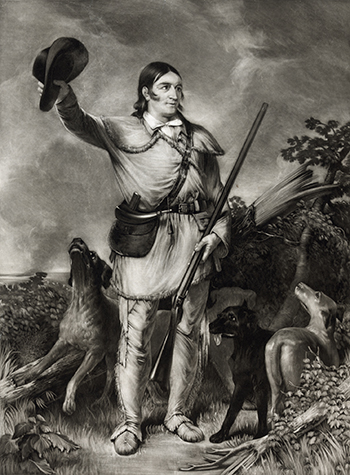Statistics researcher David I. Holmes used stylometry, the statistical analysis of literary style, to figure out if American folk hero Davy Crockett wrote three books that bear his name.
Statistics researchers used their literary detective skills to investigate the writing of American frontiersman Davy Crockett.
David I. Holmes, an assistant professor in the Department of Statistics, and Ferris Samara (BS Economics ’19) applied stylometry, the statistical analysis of literary style, to explore whether Crockett wrote three books that bear his name, including his autobiography and a diary written during the fighting at the Alamo.
Crockett’s lack of any formal education and his self-confessed inability to write coherently and grammatically have long cast doubt as to whether he was the true author, Holmes says.
“Historians have said for years that Crockett would have been unable to write the diary during his time at the Alamo, and we found that he didn’t author the books attributed to him and that they were, in fact, written by different ghostwriters,” he says.
The paper detailing their findings is published in the April issue of CHANCE, a journal from the American Statistical Association.
Holmes, who has been using stylometry since the 1980s, earned his PhD at Kings College, University of London. Doing this type of research requires large samples of 3,000 words or more, he says. It doesn’t work with short writing samples.
To do the Crockett research, Holmes recruited Samara, who had taken several of his upper-level statistics classes, to join him.
Samara was awarded an OSCAR scholarship to undertake the project, and together they applied multivariate methods and machine-learning analyses not only to Crockett’s purported works but to those of several ghostwriters that historians have suggested were his publicists and collaborators.

Statistics researchers identified ghostwriters who authored the books attributed to American frontiersman Davy Crockett.
This study is the first to employ modern stylometric methods on Crockett’s purported works, Holmes says.
The books the researchers analyzed were:
- The Life and Adventures of Colonel David Crockett of West Tennessee (1833).
- The Life of Martin Van Buren (1835).
- Colonel Crockett’s Exploits and Adventures in Texas (1836).
“In this case, we added support to the doubts historians have harbored concerning these books and, more importantly, confirm their actual ghostwriters,” Holmes says.
